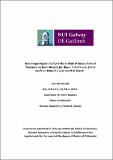| dc.contributor.advisor | Davison, Kevin | |
| dc.contributor.author | Mc Donald, Amy | |
| dc.date.accessioned | 2020-02-27T11:18:13Z | |
| dc.date.issued | 2020-02-21 | |
| dc.identifier.uri | http://hdl.handle.net/10379/15810 | |
| dc.description.abstract | Abstract
The education of girls and boys in Irish primary schools is one of the most imperative aspects of our children’s lives, yet it seems to be an area in which important focus shifts towards essentialist, simplistic debates centred around campaigns for more male role models for boys. The purpose of this research was to gain valuable insight into the opinions of practising educational professionals as to the need for more male role models in Irish primary schools, while understanding their perceptions of role modelling. The research also sought to gain children’s experiences and thoughts on their own role model and experiences of teacher gender in the classroom. In doing this, the research focuses on the experience, perception and opinions of primary school principals, teachers, coaches and students.
Throughout this interpretative research, the use of semi-structured interviews and pupil questionnaires produced a rich and informative insight into the daily pedagogical practices of professional teachers and principals, demonstrating the importance of individual role modelling and teaching pedagogy that targets children’s individual, specific needs as opposed to gender modelling. The participation of children in the research provided a more in-depth insight into their own role models and demonstrated their reluctance to see their teacher as a role model, with preference for teaching styles rather than teacher gender. The study also demonstrated how boys’ already formed masculinities can impact in their attitude towards schooling, affecting their academic interest and demonstrated how gender essentialism stops diversification in role models for boys, placing male teachers and boys into unified groups.
The study raises critical questions in relation to the call for more male role models in schools for boys and places caution towards the further reinforcement of hegemonic masculinities in school. It highlights the effects of unifying a particular cohort of boys at the marginalisation of other children. The findings and implications of the study allow for particular insight into current discourse surrounding the male role model debate as a means of regaining male power and privilege and therefore the study acts to benefit the overall educational experience of both boys and girls. In line with this, the results of the study may be of particular interest to educational professionals, educational stakeholders and legislators who create and influence educational policy. | en_IE |
| dc.publisher | NUI Galway | |
| dc.rights | Attribution-NonCommercial-NoDerivs 3.0 Ireland | |
| dc.rights.uri | https://creativecommons.org/licenses/by-nc-nd/3.0/ie/ | |
| dc.subject | Male | en_IE |
| dc.subject | Role Model | en_IE |
| dc.subject | Education | en_IE |
| dc.subject | Primary School | en_IE |
| dc.subject | Role models for boys | en_IE |
| dc.subject | Gender and education | en_IE |
| dc.subject | Gender essentialism in primary schools | en_IE |
| dc.subject | School Teachers as Role Models | en_IE |
| dc.subject | Male and female teachers | en_IE |
| dc.subject | Call for more male teachers | en_IE |
| dc.subject | teachers | en_IE |
| dc.subject | Gender Identity in schools | en_IE |
| dc.subject | Education | en_IE |
| dc.subject | Arts, Social Sciences and Celtic Studies | en_IE |
| dc.title | Interrogating the call for more male primary school teachers as role models for boys: 'I don't care if it is male or female, I just want to learn!' | en_IE |
| dc.type | Thesis | en |
| dc.local.note | This research interrogates the uncritical gendered assumption that more male role models in Irish primary schools will resolve current issues associated with the academic and behavioural underachievement of boys. Through the perspectives of practising educators and pupils, this research highlights the role of gender essentialism throughout the male teacher debate. | en_IE |
| dc.description.embargo | 2023-02-21 | |
| dc.local.final | Yes | en_IE |
| nui.item.downloads | 285 | |


